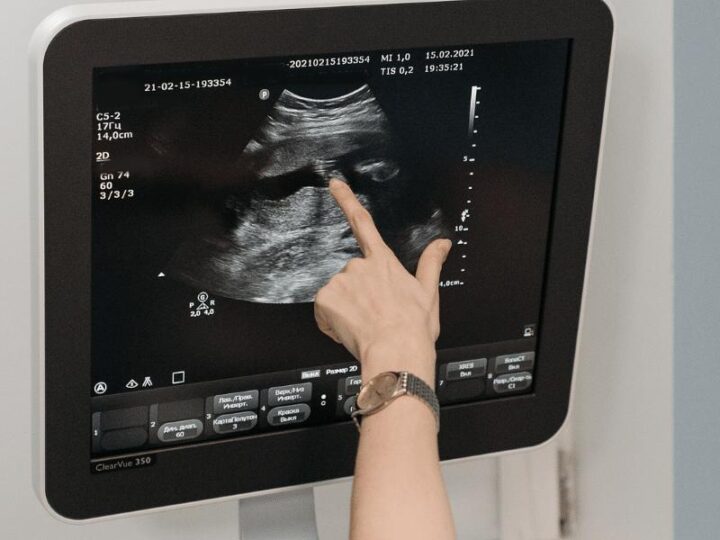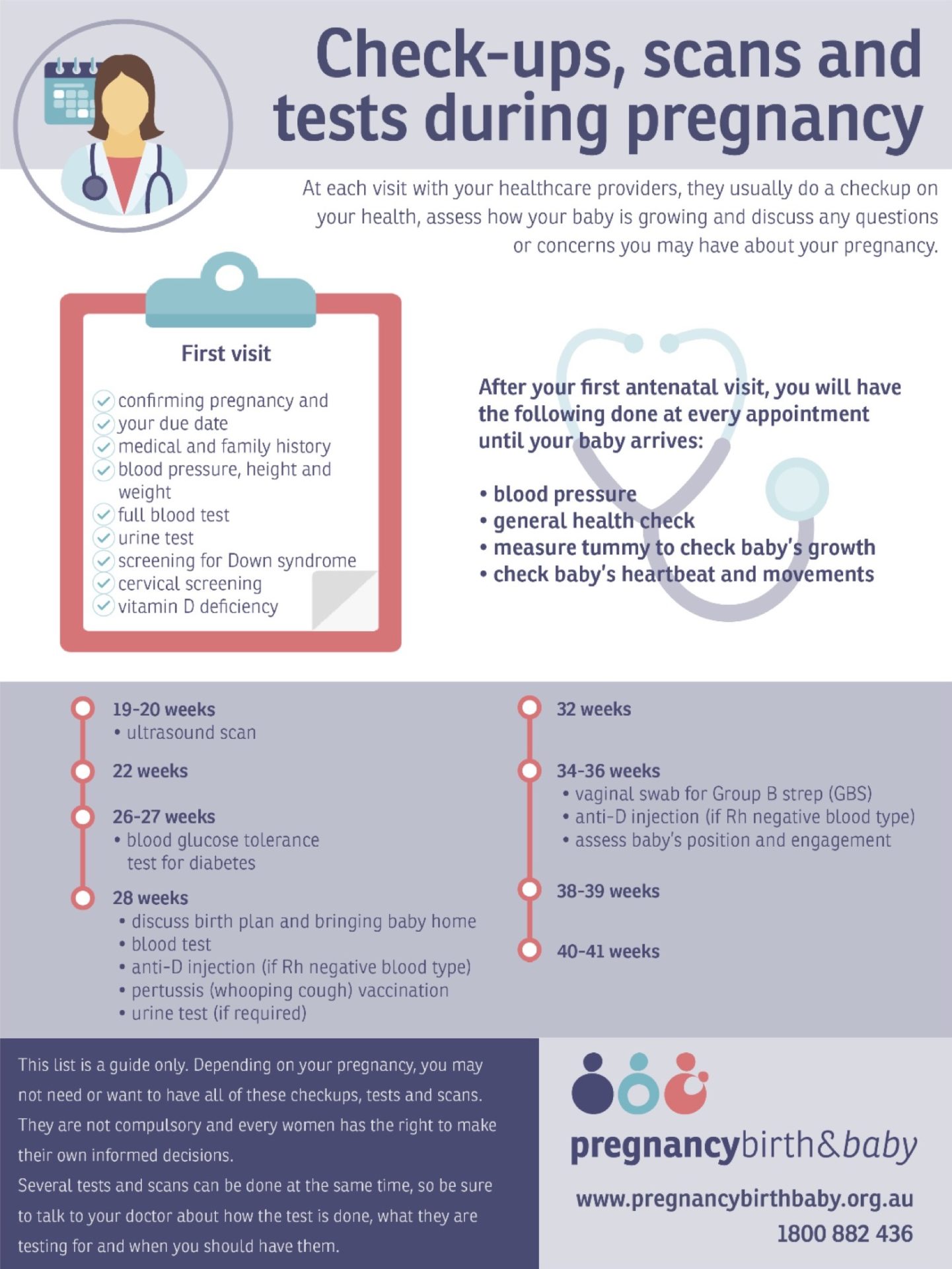What is an ultrasound scan?
An ultrasound is a procedure that uses sound waves to create images of your baby while it’s in the uterus (womb). During the scan, gel is placed on your abdomen (tummy) and a probe called a transducer is placed against your skin. Pulses of sound waves are then sent from the probe to your baby, creating echoes that are turned into images by computer. You can see these images on a monitor.
In some situations, your doctor might recommend a transvaginal ultrasound to get better pictures of your baby. This will only be done with your consent. In this case, you will be covered with a sheet while the probe is inserted into your vagina. The probe would be moved around in the vagina to take pictures of your baby. It may be a little uncomfortable, but it shouldn’t hurt.
Why have an ultrasound scan?
Ultrasound offers a safe, accessible test that can provide you and your healthcare team with more information about your pregnancy and unborn baby to help inform and guide your ongoing care.
Depending on how many weeks pregnant you are and the type of ultrasound you are having, it can:
- confirm your pregnancy is viable (meaning everything appears to be progressing well and your baby’s heart is beating)
- check for multiple pregnancies (for example, twins or triplets)
- confirm your baby’s age and estimate your due date
- check your baby’s organs and other structures are developing normally
- confirm your baby’s position in your uterus
- check the length of your cervix
- check the location of your placenta
- check your baby’s wellbeing
- check your baby’s growth and size
What routine scans might be offered during pregnancy?
Several types of scans are routinely recommended and offered during pregnancy. Although, the option to go ahead and have an ultrasound is yours.
Dating scan
The dating scan is usually done in the first trimester, although can be done anytime between 6 and 14 weeks of pregnancy. This ultrasound can confirm your pregnancy is viable and estimate your baby’s due date. It can also confirm how many babies you are carrying and check that your baby is growing in your uterus, and is not ectopic (growing outside the uterus).
Nuchal translucency scan
The nuchal translucency scan (also called a ‘12 week scan’) is usually done at 12 weeks of pregnancy, although it can be done anytime between 11 weeks and 13 weeks, 6 days of pregnancy. The term ‘nuchal translucency’ is referring to one of the key measurements taken during this ultrasound. This measurement provides some information to assess your babies risk of being affected by a chromosomal abnormality. If you choose to have additional prenatal screening, results of this ultrasound may also be combined with a blood test to further calculate the risk that your baby may have a chromosomal abnormality, such as Down syndrome.
Similar to a dating ultrasound, this scan can also check your baby’s growth, estimate due date and check the physical and structural development of you baby.
Morphology scan
A morphology scan (also known as a ‘foetal anomaly scan’) is an ultrasound usually done between 18 and 22 weeks of pregnancy. It checks your baby’s body organs, specifically looking at their structure and growth, their gestational age and size will also be estimated based on these measurements. This scan also checks your baby’s heart rate and rhythm; and makes sure your placenta is not lying near or over the cervix and that the cervix is long and closed. Depending on your baby’s position, this scan may also reveal your baby’s sex, this detail will only be shared if requested.
Why else might I need an ultrasound during pregnancy?
In some cases, if you are experiencing pregnancy complications or are worried about your baby’s movements, your doctor or midwife might recommend additional ultrasound assessments on top of those routinely offered, to ensure safe care of both you and your baby.
Can an ultrasound scan hurt my baby?
Ultrasound is a safe and pain-free test, and there is no increased risk of miscarriage or harm to your baby. The sound waves used are at very low frequency and so will not hurt you or your baby and your baby will not be able to hear them.
Do I need to have ultrasound scans?
Your doctor or midwife is likely to recommend you have one or more ultrasound scans during your pregnancy so they can check how your baby is developing, but you’re still free to choose whether or not you have the scan.
Talk to your doctor or midwife about tests and scans to understand why they might be offered to you.
Questions you might want to ask your doctor
Here are some questions you might want to ask your midwife or doctor:
- Why are you recommending this ultrasound?
- What are the benefits of having this ultrasound?
- Are there risks if I choose not to have the ultrasound?
- What does the ultrasound involve?
- When will I get the results?
Who performs an ultrasound scan?
Some medical specialists, such as obstetrician, have had specialised training and are certified to carry out ultrasound scans. In other cases, your doctor may refer you to an imaging clinic where a trained ultrasound operator known as a sonographer will check your baby. Some midwives are also trained to perform certain ultrasounds.
You might have your ultrasound in a community clinic, an imaging centre or in a hospital.
Ask your health team if you can have printed copies of your baby’s ultrasound images to take home.
How do I prepare for an ultrasound scan?
Your doctor, midwife or the ultrasound clinic you’ve been referred to, will tell you how to best prepare for your scan. In many cases you won’t need to do anything prior to or after having an ultrasound. But for certain ultrasounds sometimes having a full bladder may be helpful. It’s always best to check with your healthcare team what they prefer when you book your appointment.
How much does an ultrasound cost?
Medicare will cover part of the cost of your ultrasound scans. Ask your doctor if you should expect any out-of-pocket costs for your specific situation.
When will I get the results of my ultrasound scan?
The results from the scan are generally available on the same day. A copy of the report will be sent to your referring doctor. If there are any abnormalities or reason for concern, a specialist doctor will contact you to discuss the findings, what this may mean and next steps.
More information
One of the aims of having ultrasound scans in pregnancy is to offer a safe, accessible test that can provide you with more information about your pregnancy and unborn baby.
While these scans can reassure you that your baby is developing normally, you may also learn that your baby has an abnormality. For this reason, before you have the test it’s a good idea to think about why you are choosing to do it, and how you will feel once you get the results. Consider also who you might want to discuss any important decisions with. Your partner, a friend or family member, or a health professional such as your GP or midwife are all good options.
If the results of your ultrasound bring up any concerns about genetic conditions, you can talk to your doctor or midwife about other diagnostic tests, such as chorionic villus sampling or amniocentesis, for these conditions.
Speak to a maternal child health nurse
Call Pregnancy, Birth and Baby to speak to a maternal child health nurse on 1800 882 436 or video call. Available 7am to midnight (AET), 7 days a week.
Source: Pregnancy Birth & Baby, March 2022
Sources: RANZCOG (Antenatal care during pregnancy) ,Queensland Government (Consent information – patient copy, obstetric ultrasound) , Mater Mother’s Hospital (Ultrasound scan – your 18-to-20-week scan) ,Mater Imaging (Obstetric Ultrasound) ,RANZCOG (Prenatal assessment of foetal structural conditions) ,NPS MedicineWise (Ultrasound during pregnancy)






